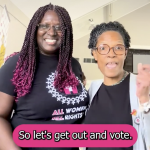Tuesday, February 28, is the second annual HIV Is Not a Crime Awareness Day (#HINACDay2023 and #HIVIsNotACrime). The day marks an opportunity to educate others about HIV criminalization and to fight unjust laws that target people because of their HIV status.
HINACDay was launched last year by the Sero Project, a nonprofit that fights HIV crime laws, along with the Elizabeth Taylor AIDS Foundation and other HIV advocacy groups across the globe.
HIV criminalization refers to the use of unfair laws to target people who have HIV—notably African-Americans, Latinos, LGBTQ people and women—and punish them based on their HIV status rather than their actions. Under outdated laws, people with HIV can be sentenced to prison simply for allegedly not disclosing their status to their partners, even in cases where HIV was not transmitted. What’s more, many older HIV laws are not based on the latest science. For example, when people living with HIV are on treatment and maintain an undetecable viral load, they cannot transmit the virus, a fact referred to as Undetectable Equals Untransmittable or U=U.
In the United States, 25 states have HIV-specific laws on the books and nine states have sentencing enhancements that apply to people living with HIV. Learn more by reading and downloading the POZ 2023 HIV Criminalization Poster and by checking out the March issue’s cover story, “Evolving the HIV Decriminalization Movement.” The article profiles the Sero Project, which is celebrating its 10th anniversary, and the organization’s incoming co–executive directors Tami Haught and Kamaria Laffrey:

Tami Haught (left) and Kamaria Laffrey on the March 2023 cover of POZ
Haught and Laffrey will step up in May, when founder and current executive director Sean Strub will retire (Strub also founded POZ, in 1994).
This year’s HIV Is Not A Crime Awareness Day—formerly referred to as HIV Criminalization Day—is marked by a number of events nationwide, many of which will be viewable online.
For example, Tuesday, February 28, at 7 p.m. ET, the Sero Project hosts a webinar titled “HIV Is Not A Crime Awareness Day: From Courtroom to Conference to Community.” You can sign up here or via the link in the Facebook post below:
The event’s description reads:
“Join HIV decriminalization advocates as they discuss how their lived experiences created change whether they experienced criminalization or learned about it - they all want to be the change we’ve been waiting for!
“BRAVERY STATEMENT
“Before we begin our conversation, it is important that we acknowledge that the subject matter discussed may contain sensitive subjects for our panelists and for some of us, including sexual assault, prosecution based on HIV status and other forms of violence. These are difficult conversations, and this is a space that honors the respect to every individual life experience and right to both privacy and non-participation in any part of our discussion.
“This is a safe and brave space.”
Another discussion on Tuesday evening is The QLatinx Facebook event “My HIV Status Is Not A Crime/Mi Estado De VIH No Es Un Crimen”:
Monday night, February 27, was a Melanated Movement specifically for Black women. (Don’t worry if you miss a discussion; many are posted and viewable at later dates.)
To find other events, search #HIVIsNotACrime and #HINACDay. You’ll find posts like this:
Learn about the importance of National HIV Is Not a Crime Awareness Day #HINACDay by tuning in to HealthHIV and @HealthHIV’s Live Twitter Space discussion. Happening on 2/28 at 1:00pm EST. @NBJContheMove @Ctr4BlackEquity @NCAIDSAction @DallasHarrisNV #StopHIVTogether #EHE pic.twitter.com/KVYUaAHx9d
— National Coalition for LGBTQ Health ????️????????️⚧️ (@Health_LGBTQ) February 24, 2023
And for a collection of criminalization articles in POZ, click the hashtag #Criminalization.
View this post on Instagram







Comments
Comments